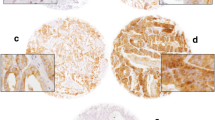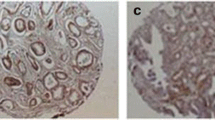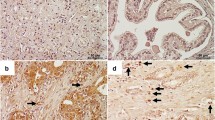Abstract
Cancer stem cells (CSCs) refer to a subset of tumor cells that self-renew and affect tumor heterogeneity. This model has attracted considerable interest in recent years due to its implications in the prognosis and clinical management of cancer because CSCs mediate the occurrence, growth, and recurrence of tumors. OCT4 is central to embryonic stem cell self-renewal and differentiation into specific lineages and encodes two chief isoforms that are generated by alternative splicing—OCT4A and OCT4B. Their function in prostate cancer (PCa) is unknown. The prognostic function of OCT4 isoforms in PCa samples was examined by immunohistochemistry (IHC) and sensitivity and specificity of the antibodies used were evaluated by molecular biology techniques. Biochemical and pathological data and specimens from 193 patients with PCa were evaluated retrospectively. IHC, western blot, immunofluorescence, and automated image analysis were also performed. IHC was performed on a tissue microarray, and western blot and immunofluorescence were performed using the PCa cell line DU-145. IHC expression of OCT4 isoforms correlated with biochemical and pathological parameters, particularly biochemical recurrence-free survival (BCRFS). Patients with higher levels of OCT4B had lower Gleason scores and decreased likelihood of experiencing biochemical recurrence (BR). OCT4A+ OCT4B− patients had the shortest BCRFS, and positivity for OCT4B expression was an independent prognostic factor for BCRFS in the multivariate analysis. We conclude that the expression of OCT4B is a strong marker of good prognosis, and its presence is associated with a decreased likelihood of BR. Thus, OCT4B might represent a powerful clinical prognostic biomarker for PCa patients.






Similar content being viewed by others
References
Schoenhals M, Kassambara A, De Vos J, Hose D, Moreaux J, Klein B. Embryonic stem cell markers expression in cancers. Biochem Biophys Res Commun. 2009;383:157–62.
Wang ZA, Shen MM. Revisiting the concept of cancer stem cells in prostate cancer. Oncogene. 2011;30:1261–71.
Du Z, Jia D, Liu S, Wang F, Li G, Zhang Y, et al. Oct4 is expressed in human gliomas and promotes colony formation in glioma cells. Glia. 2009;57:724–33.
Ben-Porath I, Thomson MW, Carey VJ, Ge R, Bell GW, Regev A, et al. An embryonic stem cell-like gene expression signature in poorly differentiated aggressive human tumors. Nat Genet. 2008;40:499–507.
Liedtke S, Stephan M, Kögler G. Oct4 expression revisited: potential pitfalls for data misinterpretation in stem cell research. Biol Chem. 2008;389:845–50.
Pardo M, Lang B, Yu L, Prosser H, Bradley A, Babu MM, et al. An expanded Oct4 interaction network: implications for stem cell biology, development, and disease. Cell Stem Cell. 2010;6:382–95.
Atlasi Y, Mowla SJ, Ziaee SA, Gokhale PJ, Andrews PW. OCT4 spliced variants are differentially expressed in human pluripotent and nonpluripotent cells. Stem Cells. 2008;26:3068–74.
Gao Y, Wei J, Han J, Wang X, Su G, Zhao Y, et al. The novel function of OCT4B isoform-265 in genotoxic stress. Stem Cells. 2012;30(4):665–72.
Wang X, Zhao Y, Xiao Z, Chen B, Wei Z, Wang B, et al. Alternative translation of OCT4 by an internal ribosome entry site and its novel function in stress response. Stem Cells. 2009;27:1265–75.
Jemal A, Siegel R, Xu J, Ward E. Cancer statistics, 2010. CA Cancer J Clin. 2010;60:277–300.
American Joint Committee on Cancer. AJCC cancer staging manual. 7th ed. New York: Springer; 2010.
Campos LC, Miyakawa AA, Barauna VG, Cardoso L, Borin TF, Dallan LA, et al. Induction of CRP3/MLP expression during vein arterialization is dependent on stretch rather than shear stress. Cardiovasc Res. 2009;83:140–7.
Karoubi G, Cortes-Dericks L, Gugger M, Galetta D, Spaggiari L, Schmid RA. Atypical expression and distribution of embryonic stem cell marker, OCT4, in human lung adenocarcinoma. J Surg Oncol. 2010;102:689–98.
Bae KM, Su Z, Frye C, McClellan S, Allan RW, Andrejewski JT, et al. Expression of pluripotent stem cell reprogramming factors by prostate tumor initiating cells. J Urol. 2010;183:2045–53.
Sotomayor P, Godoy A, Smith GJ, Huss WJ. Oct4A is expressed by a subpopulation of prostate neuroendocrine cells. Prostate. 2009;69:401–10.
Monsef N, Soller M, Isaksson M, Abrahamsson PA, Panagopoulos I. The expression of pluripotency marker Oct 3/4 in prostate cancer and benign prostate hyperplasia. Prostate. 2009;69:909–16.
Rijlaarsdam MA, van Herk HA, Gillis AJ, Stoop H, Jenster G, Martens J, et al. Specific detection of OCT3/4 isoform A/B/B1 expression in solid (germ cell) tumours and cell lines: confirmation of OCT3/4 specificity for germ cell tumours. Br J Cancer. 2011;105:854–63.
Panagopoulos I, Möller E, Collin A, Mertens F. The POU5F1P1 pseudogene encodes a putative protein similar to POU5F1 isoform 1. Oncol Rep. 2008;20:1029–33.
Suo G, Han J, Wang X, Zhang J, Zhao Y, Zhao Y, et al. Oct4 pseudogenes are transcribed in cancers. Biochem Biophys Res Commun. 2005;337:1047–51.
Wang X, Dai J. Concise review: isoforms of OCT 4 contribute to the confusing diversity in stem cell biology. Stem Cells. 2010;28:885–93.
Kastler S, Honold L, Luedeke M, Kuefer R, Möller P, Hoegel J, et al. POU5F1P1, a putative cancer susceptibility gene, is overexpressed in prostatic carcinoma. Prostate. 2010;70:666–74.
Linn DE, Yang X, Sun F, Xie Y, Chen H, Jiang R, et al. A role for OCT4 in tumor initiation of drug-resistant prostate cancer cells. Genes Cancer. 2010;1:908–16.
Zhang J, Li YL, Zhou CY, Hu YT, Chen HZ. Expression of octamer-4 in serous and mucinous ovarian carcinoma. J Clin Pathol. 2010;63:879–83.
Zhang XY, Dong QG, Huang JS, Huang AM, Shi CL, Jin B, et al. The expression of stem cell-related indicators as a prognostic factor in human lung adenocarcinoma. J Surg Oncol. 2010;102:856–62.
Guo Y, Liu S, Wang P, Zhao S, Wang F, Bing L, et al. Expression profile of embryonic stem cell-associated genes Oct4, Sox2 and Nanog in human gliomas. Histopathology. 2011;59:763–75.
Matsuoka J, Yashiro M, Sakurai K, Kubo N, Tanaka H, Muguruma K, et al. Role of the stemness factors Sox2, Oct3/4, and Nanog in gastric carcinoma. J Surg Res. 2012;174(1):130–5.
Gao Y, Wang X, Han J, Xiao Z, Chen B, Su G, et al. The novel OCT4 spliced variant OCT4B1 can generate three protein isoforms by alternative splicing into OCT4B. J Genet Genom. 2010;37:461–5.
Liedtke S, Enczmann J, Waclawczyk S, Wernet P, Kögler G. Oct4 and its pseudogenes confuses stem cell research. Cell Stem Cell. 2007;1:364–6.
Zangrossi S, Marabese M, Broggini M, Giordano R, D'Erasmo M, Montelatici E, et al. Oct-4 expression in adult human differentiated cells challenges its role as a pure stem cell marker. Stem Cells. 2007;25:1675–80.
Acknowledgments
We acknowledge Fundação de Amparo à Pesquisa do Estado de São Paulo.
Conflicts of interest
None
Author information
Authors and Affiliations
Corresponding author
Rights and permissions
About this article
Cite this article
de Resende, M.F., Chinen, L.T.D., Vieira, S. et al. Prognostication of OCT4 isoform expression in prostate cancer. Tumor Biol. 34, 2665–2673 (2013). https://doi.org/10.1007/s13277-013-0817-9
Received:
Accepted:
Published:
Issue Date:
DOI: https://doi.org/10.1007/s13277-013-0817-9




